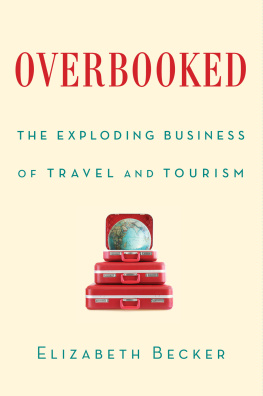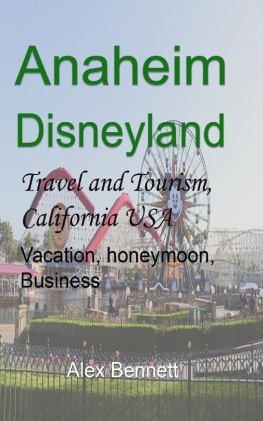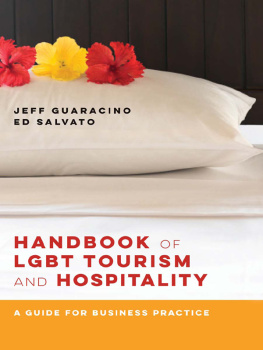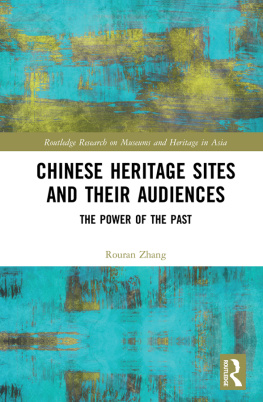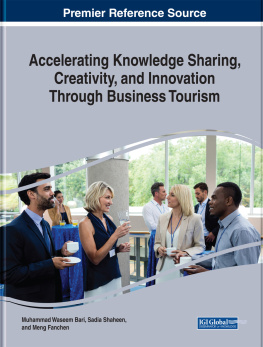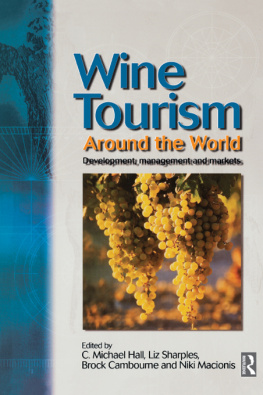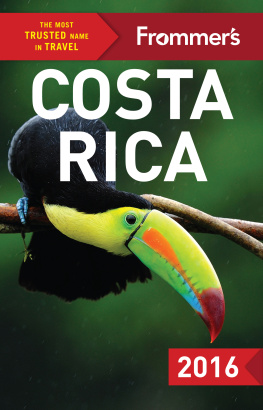Acknowledgments
This was a rare book project where I was required to work hard and at the same time experience the joys and travails of travel. Thanks to a long list of people, I was able to do just thatinvestigate the tourism industry and measure the delights of travel along the way. In this regard, I chose my subject well.
Ill say more about my family, but at the head of the list of everyone to whom I am indebted is my husband, Bill Nash. Bill was my traveling partner and my first reader without whom I could not have written this book. He was my logistician, my navigator and my nudge who reminded me after missed flights, week-long jet lags and cancelled appointments why this book was important. He also kept track of the best restaurants.
To begin at the beginning, I want to thank my former colleagues, the incomparable reporters and editors at the New York Times , especially Jill Abramson and Richard L. Berke who appointed me the newspapers international economics correspondent, the beat that sparked my curiosity about tourisms role in the global economy, and Tom Redburn, my editor at the Times who schooled me on the intersection of business, economics and politics. At Harvard Universitys Kennedy School of Government, I was the lucky recipient of a generous fellowship at the Joan Shorenstein Center on the Press, Politics and Policy where I studied tourism with the centers resident scholars and professors: thank you Richard Parker and Thomas E. Patterson for sharpening my ideas and Edith Holway for taking care of me.
When I wasnt traveling, I was mining the resources of Washington, D.C., my home town, which is filled with stellar institutions. The Library of Congress was invaluable, and the library at the National Geographics headquarters is a gem. The Council on Foreign Relations, the Carnegie Endowment for International Peace, the Brookings Institution, and Politics and Prose Bookstore hosted speakers and discussions that enriched my research. I interviewed officials in Congress, the State Department, the Commerce Department and the office of the U.S. Trade Representative. And as the capital, Washington is home to trade groups, special interest groups and businesses that all want to influence the government, and those people were also generous with their time.
Indeed I am grateful to all of the officials, members of the tourism industry and experts whom I interviewed and quote in the book. Thank you for your insights, for speaking on the record and for opening up your corner of the industry for this book. I hope that I was faithful to your ideas and what matters to you and the business. Any mistakes are my own.
And thank you to the tourists whom I met along the way and whom I quote by first name only since you met me as a fellow tourist, not as a writer. You were generous and thoughtful and gave life to this story.
Several people went out of their way to help me contact essential people in the broader network of tourism. Thank you to Jonathan Tourtellot at the National Geographic for invitations to his awards ceremonies and sharing studies of the industry; to Kathleen Matthews of Marriott International who gave me essential introductions to the higher reaches of the industry; to Roland Eng in Cambodia; to Marcelo Risi at the United Nations World Tourism Organization who organized my visit there; to Thomas Fiedler, formerly of the Miami Herald , for his knowledge of Florida; to Geoffrey Freeman of the U.S. Travel Association who briefed me on the ins and outs of 21st century U.S. tourism; to David Barboza of the New York Times in Shanghai for opening up some of those doors; and to Marion Fourestier of the New York office of ATOUT, the official French tourism agency, who helped me set up the complicated research trip to her country.
In researching this book I followed basic journalistic guidelines and paid for my travel expenses with one exception. Bill and I spent several nights as guests of Geoffrey Dobbs at his hotel in Sri Lanka and, in recompense, made a donation to his charity Adopt Sri Lanka. In three instances, some of my travel expenses were paid by sponsors of conferences where I made speeches or led workshops. Friends in other countries opened their homes to me as I traveled, and I want to thank Marianne Faure-Chaigneau in France, Mark Storella in Zambia, and Christophe Peschoux in Cambodia. And I am especially grateful to Ann and Walter Pincus for offering regular refuge and hospitality at their beach house in North Carolina.
I am also grateful to my friends in our exercise group who regularly kept up my spirits: Megan Rosenfeld and Bonny Wolf, two writers; and Gayle Krughoff and Elisabeth Wackman, both photographers.
For reading all or part of my manuscript with a critical eye, I am grateful to Elizabeth Newhouse, whose years of editing travel books kept me on the right track; to Harold Wackman for helping me avoid myriad mistakes on Africa; and Karen DeYoung for reading the U.S. chapter. Others I will leave anonymous except for my talented in-house editor, my daughter Lily, who convinced me to scrap an essential chapter and start over again.
All of my family sustained me through the research and writing of Overbooked by believing in the book. My son Lee Hoagland gave me evocative photographs and critical advice; in our blended family, Bills daughter Rebecca and her husband Matthew Engelke had lively opinions on the text. Bills grandchildrenCharlotte and Julia, Harriet and Louiskept me young. My sisters Susan Becker Donovan, Janice Becker and Mary Becker Nelson are a constant pillar in my life. And in a category of his own, our dog Lafayette Jones was my faithful walking partner.
For years David Halpern, my agent at the Robbins Office, has made my writing life a joy, taking care of business so I could get on with my work. Finally, I want to thank the expert team at Simon & Schuster who were responsible for this book, including Karyn Marcus, a senior editor, Jonathan Cox, editorial assistant, and above all my editor, the legendary Alice Mayhew. She deserves every word of praise that has been used to describe her extraordinary talents. She understood dimensions of this book before I did, shaping it from start to finish with her refinements to the text and her penetrating questions. My debt to her is large, for this book and my previous book on Cambodia. Working with her is a privilege.
Afterword
This examination of travel and tourism, how it was transformed from one of lifes greatest pleasures to one of the worlds biggest industries, offers a glimpse of the enormous dimensions and impact of the industry. For many countries, rich and poor, income from tourists is essential to their well-being. In other countries, tourism has been poisonous, destroying local livelihoods, neighborhoods and communities. Taken together, all of our innocent vacations and trips have changed lives and the fortunes of nations.
In 2012 the world passed the 1 billion mark for international trips. That means that some of the 7 billion people on earth made 1 billion trips across foreign borders. All signs point to the industry growing larger, and faster. Eventually travel and tourism will be at the top of the list of issues for leaders in business, government and civil society to discuss.
On its own, travel is neither good nor bad. The travel and tourism industry, however, has good and bad impacts, and governments are central to determining what that outcome is. Tourists arent neutral either. Individually they make profound choices and when traveling in hordes they can do tremendous damage. The flash points of travel and tourism are the same around the world: local communities feeling powerless in the face of their governments and big industry; the industry feeling hamstrung by opaque regulations and corrupt government officials; civil societies feeling ignored when they try to protect their forests and beaches, neighborhoods and children; scientists and environmentalists being silenced when they warn that travel is one of the human activities that is changing our climate.


